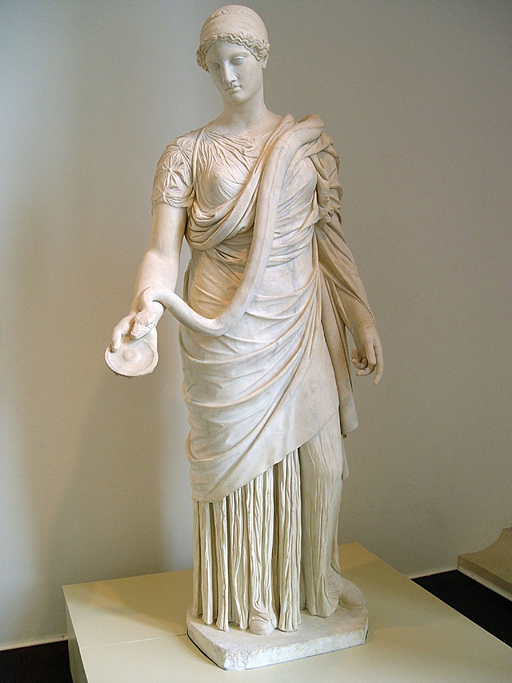1.3 Health and the gods
When you think about whether you are healthy, or what health is, you may think in terms of medicine rather than religion. But in the past, the lines between these two areas were drawn differently from today. The gods and goddesses were involved in health and healing, as they were with every aspect of daily life in the ancient Greek and Roman worlds.
Figure 1 shows Hygieia, the goddess of health in both Roman and Greek mythology. In fact, the ancient Greek word hygieia means ‘health’. Hygieia was the Greek idea of health personified and she was worshipped in Greece from the fifth century BCE. In a hymn written to her by Ariphron in around 400 BCE, she was addressed as follows:
Health, greatest of the blessed gods, may I live with you
For the rest of my life, and may you be a willing inmate of my house.
In mythology, Hygieia was one of the daughters of Asclepius, a man whose mother was a mortal woman, Coronis, but whose father was the god Apollo. Asclepius was a doctor who, in some versions of the myths about him, eventually tried to cure death itself using the blood of a Gorgon, or special herbs. Hygieia is often shown with a snake – as she is here – an animal which, because it sheds its skin, was a symbol of immortality. Snakes were also found in the temples of Asclepius, where people would go for healing, and there are stories of them licking suppliants while they slept at the temple.
The medicine of the temples was not entirely separate from the medicine of doctors, and it is known that some temples of Asclepius had resident doctors. One of the most famous doctors in the ancient world was Hippocrates, who is supposed to have worked in the fifth–fourth centuries BCE. Around 70 works attributed to him survive, although it is probable that none of them were actually by him; instead, works of other doctors were classified under his name because he was so famous. One such document, the ‘Hippocratic Oath’, originally included swearing by ‘Apollo the doctor, Asclepius, Hygieia and Panacea and all the gods’ that the doctor would respect his medical instructors and keep patient confidentiality. Panacea, which literally means ‘all-heal’, was another daughter of Asclepius.
Hygieia is shown as a young woman, modestly dressed – quite unlike the ‘bikini girls’ – and she sometimes carries a vase, which may contain medicine. She often features in art standing beside her father, and neither appear as anything other than well-fed, strongly built figures. This is not true of all gods: for example Hephaistos, the blacksmith of the gods, was portrayed as lame.
Health or healing could be obtained from other divine beings, not just Asclepius and his family. The goddess Athene also had the epithet ‘hygieia’. When an Athenian workman fell from a height while working on the gateway to the Acropolis in around 430 BCE, Athene appeared to the person responsible for the building project – the Athenian general Pericles – and told him how to treat the injured workman. When the workman recovered, he set up a statue of Athene Hygieia.
Activity 3
The English ‘hygiene’ comes from hygieia. In Latin, the main word for ‘health’ is salus, from which the word ‘salubrious’ is derived.
Does your language contain words that come from ancient Greek or Latin terms for health? What other similar words are there in your language, and what does this tell you about ideas of health? Use the internet or a dictionary to find out the origin of the word ‘health’ itself. Make a note of your findings here.

